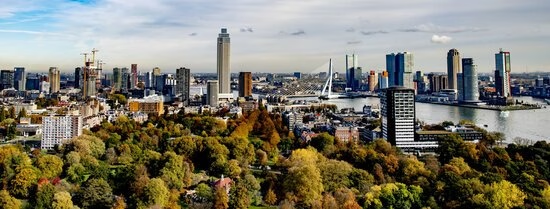Technology in the city is everywhere, also in Rotterdam. But are citizens really waiting for all those cameras and sensors? According to Vivien Butot (Erasmus School of Social and Behavioral Sciences), that question is rarely asked. He studied how residents think about the smart city and finds that many people see the increasing role of technology as inevitable. More resistance is in order, according to the PhD student, and in this we can learn something from 5G action groups, according to Butot.
In your research, you mainly talk about the smart city in the context of security. What should I think of then?
"That could really be anything. Think cameras and sensors, but also neighbourhood prevention WhatsApp groups. The basic principle is that you want to use digital technology and data to manage and improve the city smarter. An awful lot is happening in that field, but within Smart Cities, the topic of safety is a bit of a forgotten child. I find that crazy, because developments are happening fast and there is often more happening than people think."
Can you give a telling example?
"More and more people have doorbell cameras, and that’s an ambiguous area. Nobody knows exactly what happens to those images. I recently read an article in Dutch newspaper NRC about a school in Utrecht that called on local residents to share images of children setting off fireworks. I understand that you want to use that footage in case of a burglary, but for a few firecrackers, I think that's going too far. Besides, you can't just share such images, let alone request them."
You mainly looked at how citizens think and talk about smart technology. What struck you?
"What I find very interesting is that many people see new technology as inevitable. Something that was unthinkable 20 years ago has now become normal, the reasoning goes. 'We grow into it', 'I am adapting' or 'it is a form of evolution', I got back. Of course there are concerns, but then people often lapse into cliché comparisons with China and Big Brother. They see possible discrimination against systems as problematic, but often think that only others are at risk. This also applies to people in South or Rotterdam West who I spoke to. While yet you could see with the Dutch ‘Toeslagen’ - scandal that you can be affected unexpectedly."
How did you research this?
"I did several studies. In one study, I instructed citizens to take photos of objects they associate with the smart city and then reflect on them using questions. I also discussed different fictional scenarios in interviews. My supervisor urged me to really push the edge and come up with far-fetched scenarios. My research began in 2018 and, to my mind, was sometimes overtaken by time. The techniques that seemed sought after at the time are sometimes already there. For example, a scenario where you get messages advising you to avoid unsafe areas on your route. Such apps have been around for a while."
The technology is very complex. Do citizens still understand what is possible and permissible?
"Technology can be elusive for many people, but that doesn't mean you can't have an opinion. You can also look from the application of a particular technology. I found that people are quite capable of reasoning about this. For instance, I spoke to women who indicated that they like the idea of walking in the sight of a camera at night. Yet they are under no illusions that a camera offers safety guarantees, because the images are often only viewed after the fact and, moreover, this does not eliminate the causes of insecurity on the streets."
"In my research, I also looked at anti-5G action groups. They are often dismissed as wappies, but some organise themselves extremely effectively and come to the table with administrators"
Vivien Butot
Researcher
Is more criticism and opposition appropriate?
"Absolutely. One of my chapters is called 'Make smart things strange again'. I think it is good to question 'smart' technologies that have been normalised again. For example, not having a smartphone or not being on social media is now radical. People feel powerless to influence. Adapting is then the path of least resistance. Democratically, this is problematic, because then we leave the smart city to groups that know how to use it. Yet there is resistance. In my research, I also looked at anti-5G action groups. They are often dismissed as wappies, but some organise themselves extremely effectively and come to the table with administrators. You can argue about positions and arguments, but we can learn something from their involvement. After all, they show that a smart city is not an inevitability, but involves all kinds of choices that can be talked about."
- PhD student
- More information
- Related content

